 Game ranger Bradley Sheldon laughs with delight as a dozen elephants swing by our vehicle, so close that they stretch out their trunks to smell us.
Game ranger Bradley Sheldon laughs with delight as a dozen elephants swing by our vehicle, so close that they stretch out their trunks to smell us.
He’s oozing as much excitement as the two Brazilian honeymooners on their first trip to Africa, even though he does this for a living. Game drives in Thornybush Private Nature Reserve never used to be like this, he grins. Not too long ago there were only 62 elephant in the whole enclosed reserve, and if they were in a different part you might never see them. The last census recorded a five-fold increase to 350, so close encounters are practically guaranteed.
The change came when Thornybush landowners finally started ripping out a 27km fence that separated their 14,500 hectares from Timbavati Game Reserve, which has open borders with the Kruger National Park. Now animals can migrate from the Kruger through Timbavati and into Thornybush, and they’re doing so en masse. “Now there are bulls all over the show, big tuskers coming from the Kruger,” Bradley says.
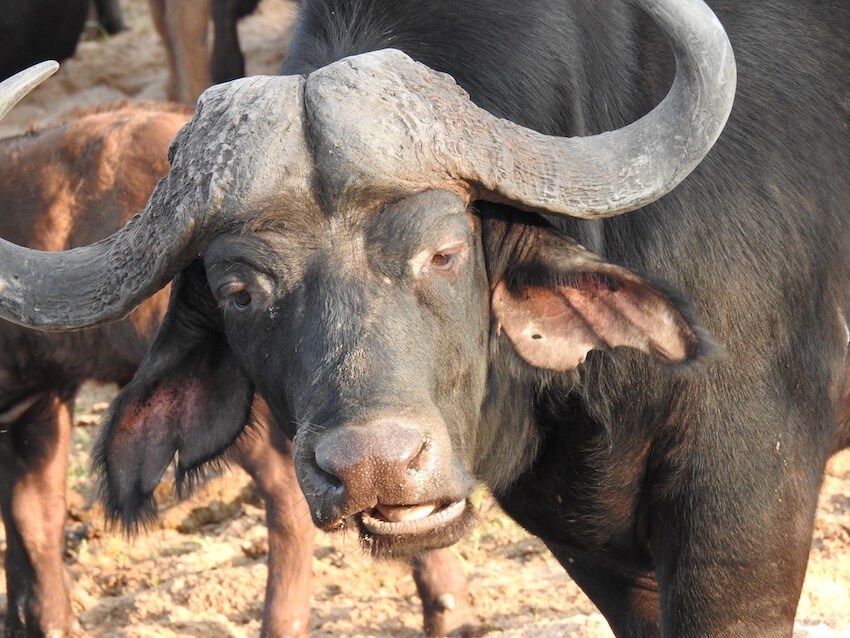 Lions have also discovered this new hunting ground. “The lion activity has changed with males coming and going so anything can happen now. It’s no longer a case of always seeing the same male lion. Now it’s ‘will he still be around, what’s changed?’ There could be a pride take over at any time and that dynamic makes things a lot more exciting.”
Lions have also discovered this new hunting ground. “The lion activity has changed with males coming and going so anything can happen now. It’s no longer a case of always seeing the same male lion. Now it’s ‘will he still be around, what’s changed?’ There could be a pride take over at any time and that dynamic makes things a lot more exciting.”
Bradley has worked in Thornybush for nearly three years, and says the rangers are loving the added thrills since the fence fell. One of the great places to stay there is the 5-star Thornybush Game Lodge, which has 20 chalets, and enough rangers and guides to make sure there are never more than eight guests to a vehicle. Visitors who have been before will definitely enjoy a richer experience, he says.
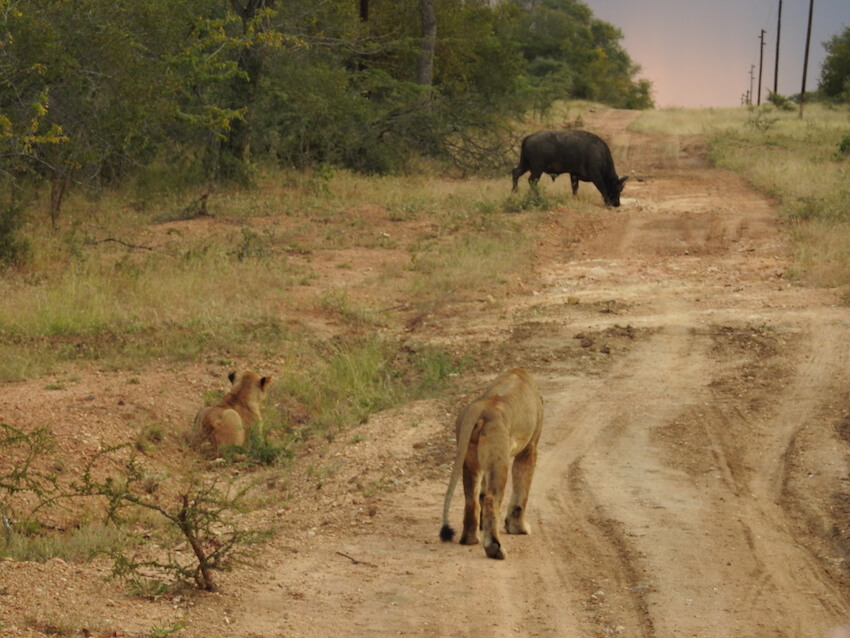 To prove the point, tracker Orlando Mawele points out a young lion ahead, then quickly spots its two siblings. A grumpy old buffalo expelled from his herd is eyeing them, spoiling for a fight. He gets it, when one of the lions makes a sudden dash forward and leaps onto the buffalo’s flanks. They tumble off together into the thick scrub, and we hear a melee of painful sounding yelps and snorts. Suddenly they reappear, now with the buffalo charging after a bloodied and chastised lion.
To prove the point, tracker Orlando Mawele points out a young lion ahead, then quickly spots its two siblings. A grumpy old buffalo expelled from his herd is eyeing them, spoiling for a fight. He gets it, when one of the lions makes a sudden dash forward and leaps onto the buffalo’s flanks. They tumble off together into the thick scrub, and we hear a melee of painful sounding yelps and snorts. Suddenly they reappear, now with the buffalo charging after a bloodied and chastised lion.
When the action dies down, Bradley chips in again. “The dynamics have changed completely so it feels more wild and pristine, and the interactions are more interesting. Before it was very confined. There was no chance of anything coming in because of the fence, so this has created a nice freedom of movement.”
That freedom has seen some animals drift east into the Kruger, especially grazers looking for the tastiest grass. But they’ll be back as the seasons change now that their traditional migrating routes are being restored.
Later we watch thousands of red billed quelea propel themselves out of some trees in unison, swirling and swooping and miraculously never hitting each other. What triggers these sudden bursts of flight, I wonder, with each bird launching into the air at the exact same moment.
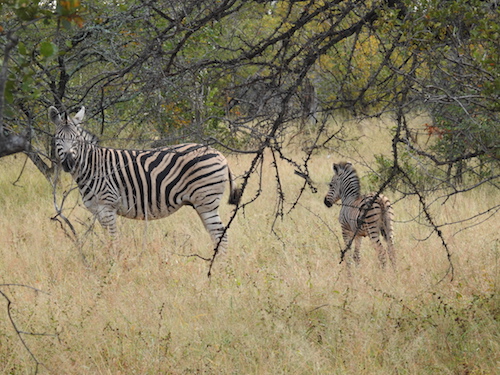 Further on we watch a determined elephant push over a tree to reach its succulent roots. It eats for a moment, then wanders off, leavng destruction in its wake. The drastic re-landscaping wreaked by the heavy influx of elephants is being assessed every quarter by zoologists. If too many of the largest trees are demolished, vultures that clean up dead bodies and stifle the spread of diseases will be homeless. Since the whole ecosystem depends on vultures, things could get messy.
Further on we watch a determined elephant push over a tree to reach its succulent roots. It eats for a moment, then wanders off, leavng destruction in its wake. The drastic re-landscaping wreaked by the heavy influx of elephants is being assessed every quarter by zoologists. If too many of the largest trees are demolished, vultures that clean up dead bodies and stifle the spread of diseases will be homeless. Since the whole ecosystem depends on vultures, things could get messy.
The latest report is that the pachyderm population is stabilising, says Nic Griffin, CEO of Thornybush Luxury Game Lodge Collection. “It’s inquisitiveness - the elephants heard there was a new place to go. When they see it’s not a lot different from where they’re used to, they go back to where they were. The boffins who have this vision say it will all settle down and we will have a much greater variety of game and they will be happier that they can move around.”
The next fence likely to fall will be with Kapama Private Game Reserve to the west, but Guernsey Road lies between them, so a traffic issue must be resolved first. The process is being encouraged by the Peace Parks Foundation, founded by Dr Anton Rupert with the vision of reopening ancient migration routes that let animals move between South Africa, Mozambique, Malawi, Botswana and Zimbabwe. The overall aim is to create vast conservation areas straddling national borders. But with many stakeholders involved, the process typically unfolds over many years.
Poaching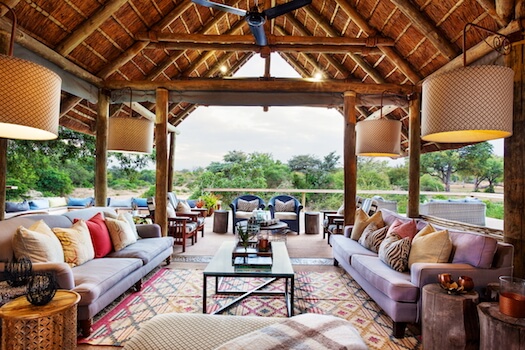 and politics are among the biggest challenges, Griffin says, but the mindset of people with the power to make it happen is gradually shifting. For game lodges it’s a smart business decision, because customers are pushing them to accede as much as the conservationists. “One of the impediments to Thornybush was that we were a closed reserve, so many travel agents said it’s just a big zoo. It’s the right thing to do to allow animals to be less restricted, and it’s enriched our whole game experience.”
and politics are among the biggest challenges, Griffin says, but the mindset of people with the power to make it happen is gradually shifting. For game lodges it’s a smart business decision, because customers are pushing them to accede as much as the conservationists. “One of the impediments to Thornybush was that we were a closed reserve, so many travel agents said it’s just a big zoo. It’s the right thing to do to allow animals to be less restricted, and it’s enriched our whole game experience.”
Griffin was delighted when the farmers and landowners finally agreed to pull the fence down, although he had one reservation. “Without animals we don’t have a business, so at a board meeting I said if we take the fences down will our animals run away? I was absolutely for it, but I wanted somebody to give me some sleep-easy that it wasn’t going to happen. Nobody could, but they assured me it hadn’t happened in previous experiences.” It turns out that animals want the same as humans want, he says: food, water and security. Thornybush has an abundance of watering holes, rich vegetation, and strong anti-poaching protection, and gained far more than it lost.
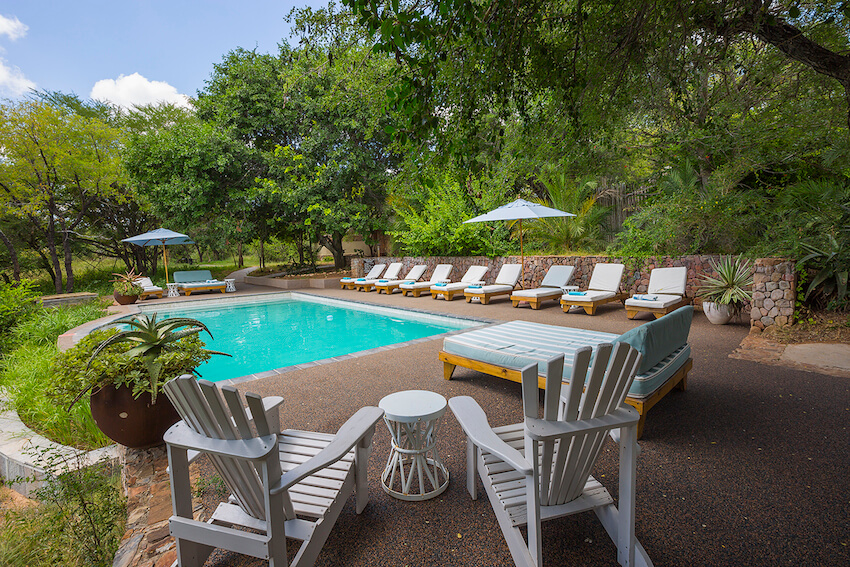 Twelve lodges trade under the Thornybush Luxury Game Lodge Collection, which owns some, leases others and markets them all. That offers economies of scale for administration and marketing overseas, since 80% of guests are foreigners. Although Thornybush is now entirely accessible to animals, most local humans find its 178 beds prohibitively expensive. It’s simply impossible to operate at rates that appeal to the average South African because running a lodge is very costly, Griffin argues. Security costs alone have more than quadrupled over two years because of poaching. Another expense is staff accommodation, because they can’t travel home through the reserve at night.
Twelve lodges trade under the Thornybush Luxury Game Lodge Collection, which owns some, leases others and markets them all. That offers economies of scale for administration and marketing overseas, since 80% of guests are foreigners. Although Thornybush is now entirely accessible to animals, most local humans find its 178 beds prohibitively expensive. It’s simply impossible to operate at rates that appeal to the average South African because running a lodge is very costly, Griffin argues. Security costs alone have more than quadrupled over two years because of poaching. Another expense is staff accommodation, because they can’t travel home through the reserve at night.
The 20 rooms at Thornybush Game Lodge were recently renovated for R1 million each, more than double what it would cost in a city. Its remoteness and the fact that work could only be done when guests were on game drives meant the workmen spent long periods waiting to continue, and the project took 14 months. Griffin hopes the investment will be recouped when more visitors support the reserve now that it’s open to the Kruger.
For details see www.thornybush.co.za